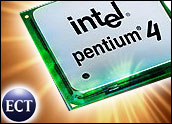
Intel, the world’s largest maker of computer chips, announced yesterday that its profit nearly doubled in the second quarter as the company reported strong sales for a type of memory chip commonly used in consumer gadgets such as cell phones.
The company reported earnings of $1.8 billion (27 cents a share), up from $896 million (14 cents) in the same three-month period last year. Revenue increased 18 percent, to $8.05 billion during the same quarter.
Intel’s chief financial officer, Andy D. Bryant, said sales of the cell phone chip, called flash memory, should remain strong enough in the next three months to help the company take in $8.2 billion to $9.2 billion of revenue, slightly more than it typically would expect this time of year.
But flash memory chips are only a relatively small part of Intel’s business. More than three-quarters of its revenue comes from sales of chips used in computer processors, and Intel’s earnings report did little to allay investor concerns that too many companies are producing too many computer chips at a time of slowing demand, creating an oversupply that may push down prices and profits.
Tech Stocks Shuddering
Tech stocks shuddered earlier this week in the wake of a Merrill Lynch report issued Monday that warned of the looming problem and suggested that share prices for many chipmakers may be too high to justify. The report advised investors to avoid Intel.
Bryant acknowledged the oversupply concern yesterday, saying that the company is working to get rid of excess inventory and may do so by reducing the workload on some of its chip production factories.
Over the past year, Intel’s stock grew from about $24 a share to a peak of $34.59 in January. For most of 2004, however, Intel’s share prices have sunk. The stock closed yesterday at $26.14, then dipped to $25.10 in after-hours trading.
“Stock prices have declined, but we believe that they have the potential to decline further,” concluded the Merrill Lynch report, written by Joseph Osha and a team of other analysts.
Sales Generally Up
Sales are generally up across the semiconductor industry, according to the Semiconductor Industry Association, a trade group that released a report last week finding that worldwide sales of semiconductors rose to $17.32 billion in May, a 36.9 percent increase over the same month last year.
“I don’t think there’s anything wrong on the demand side,” said Michael Cohen, director of research for Pacific American Securities. “[But] prices are being driven down so fast that profits and earnings can be hurt.”
As one example, Cohen cited Conexant Systems, a New Jersey company that makes components used in wireless Internet chips and cable modems. Last week the company issued a warning that revenue would be less than previous projections as a result of competition from low-cost chip suppliers in Taiwan. Conexant’s stock dropped more than 40 percent following the announcement. Many software makers have also recently issued warnings that they would miss earlier earnings projections based on strong growth rates.
Ultraportable Computers
Bryant at Intel said that such warnings were, “a cause for concern, but inside our business we’re seeing no signs of a problem.”
Some analysts are less sanguine.
Consumer electronics juggernaut Sony, for example, is collaborating with Toshiba and International Business Machines on a chip to power Sony’s next PlayStation video game console. Some analysts think that chip might also be used to run personal computers, a move would be a direct attack on Intel’s core business.
Some analysts think an upcoming type of pocket-sized computers that run Microsoft’s Windows operating system could provide an inroad to smaller competitors, if this product class catches on; Intel does not have a chip that will work for such products.
Cohen at Pacific American Securities said he thinks such “ultraportable” computers might just catch on. He saw some early models in the works at a trade show earlier this year. “My reaction?” he said, “I want one.”

































